12
VERSAILLES, January 28, 1777
The Comte de Vergennes,1 France’s skillful Foreign Minister, “paused for a moment,” so British Ambassador Lord Stormont reported to London. “Then he said with a serious and even melancholy tone: ‘You cannot conceive what engines are at work, what wheels within wheels!’”
It was a diplomatic tactic to evade Stormont’s blunt charge that five ships were at that moment loading in French ports with arms for Britain’s American rebels. Vergennes’ suggestion that he was enmeshed in a web of court intrigue he could not control was just another move in the highly sophisticated game the two men played very frequently, often several times a week, in the massive Palace of Versailles.
Their conversations, invariably polite, civilized, even witty, were always conducted under the shadow of the threat of major war. The maneuvering was not confined to talking. Many of Stormont’s letters home were phrased especially for French spies; that is why two reports to London sent on the same day by different couriers could sometimes contradict each other.
The British were exceptionally well informed of Vergennes’ undercover support for the rebels. It was now six months since a onetime schoolteacher named Silas Deane had arrived in Paris, the first agent to be sent to France by the Congress’ Committee of Secret Correspondence to negotiate assistance for the rebel cause.
Deane had appointed as his secretary an American, William Bancroft, who had once been his pupil and was now a London-based financial speculator.
Accustomed as he was to living on his wits, Bancroft had quickly perceived the potential in his new association with the Congressional agent and promptly offered his services to the British, which were accepted under an agreement that gave him £500 down and an income of £400 a year. For this he reported regularly on Deane’s contacts with the French to the British Secret Service’s Paul Went worth, another American living in London. Using the cover name of “Dr. Edwards,” he left his reports in a hollow tree in the Terrace des Tuileries, where Stormont arranged their collection for dispatch to London.
Within days of Deane’s first interview with Vergennes at Versailles, the British had full verbatim details of the meeting. The American had told the French minister that news of the Declaration of Independence would arrive shortly in Europe. Congress sought alliance with France. Would the French court recognize the American provinces as independent states?
Vergennes, one of the most experienced and brilliant diplomats in Europe, was not being rushed. The Independence Declaration, he said, was an event “in the womb of time” at present recognition was out of the question, for it would provoke immediate war with Britain. However, he remarked carefully, “if the Colonies are determined to reject the sovereignty of His Britannic Majesty, it would not be in the interest of France to see them reduced by force.”
The American Revolution offered obvious opportunities to a French Foreign Minister who planned revenge for his country’s humiliation ten years before. But he was not yet ready for open conflict. He agreed to support the rebels but insisted on great caution. After the first interview in the palace, all future meetings with Deane were arranged secretly in the home of the minister’s secretary.
Since the French court could not expose itself to charges that it was aiding Britain’s rebels officially, a private company took over the role of secret supplier of arms, cannon and clothing. Its somewhat bizarre president was the dramatist Pierre de Beaumarchais, author of The Barber of Seville.
Beaumarchais’ ships sailed for America with false papers, which concealed both the cargoes and the destination; usually they were routed technically to Santo Domingo in the Caribbean.
The cover was not very effective since Bancroft informed the British of every detail from the start. Naturally, Stormont had not revealed the extent of his knowledge—he was far too subtle a diplomat—but from time to time in his sparring with Vergennes, he had hinted at the range of information that was being garnered by British agents.
Beaumarchais’ company was not the only corporation in Europe supplying the rebels. Despite repeated protests by Britain’s ambassadors to the courts of Europe, American vessels were often in Continental ports loading with munitions before making a dash across the Atlantic through the blockade of royal cruisers.
Stormont had often complained before, but this meeting in January between the two diplomats was tenser than usual despite the diplomatic pleasantries. For there was a novel and alarming aspect about the ships that were now taking on board those controversial cargoes: They would not be flying the American striped flag from their mastheads, but sailing under French colors, manned by French crews.
This meant that the French were getting bolder, testing the British closer. Every move that either country made—the repercussions of which were explored in the meetings between Stormont and Vergennes—was performed against the key question: Just how far could France go in helping the rebels without causing a complete and explosive rupture with Britain? And just how aggressively could Britain try to stop traffic without producing the same result?
The European political background was growing continually more critical for Britain. Regularly in Parliament the Whigs flayed ministers with bitter criticism for sending so much of their strength across the Atlantic when the danger of attack from the Continent was so imminent.
This was not merely militant politics; the risk was grave. France, a nation with a population three times that of Britain, was arming and building up its fleet at an alarming rate. Count Pedro Aranda, the Spanish ambassador in Paris, made little secret of his desire for joint attack on the British and hoped, indeed, to command his country’s military forces.
Locked in a major war across 3,500 miles of ocean, Britain had no friends left in Europe except Portugal. Facing the rising hostility of the Bourbon Kings of France and Spain, the most it could hope for from the Hapsburg Joseph of Austria, since he was the brother of Marie Antoinette, was to keep his nation out of any conflict that France might initiate.
Catherine of Russia had already refused with blunt rudeness to lend King George any troops. Shortly Frederick of Prussia, who had been unhappy with his rewards at the end of the Seven Years’ War, was to make his position coldly clear by withholding his permission for Hessian reinforcements to cross his territory on their way to America.
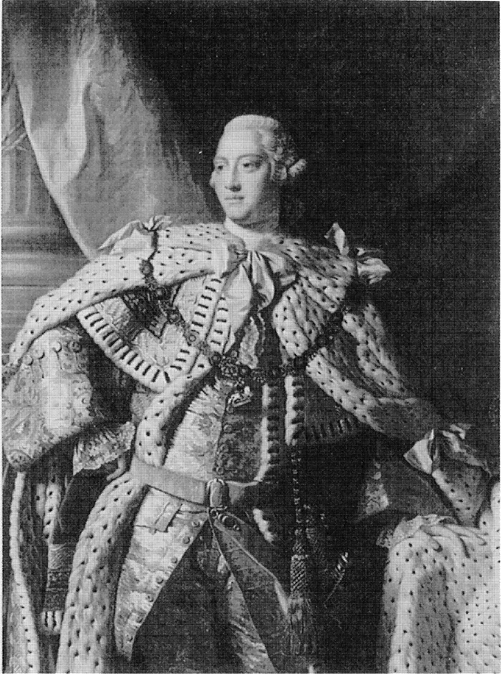
GEORGE III
National Portrait Gallery, London
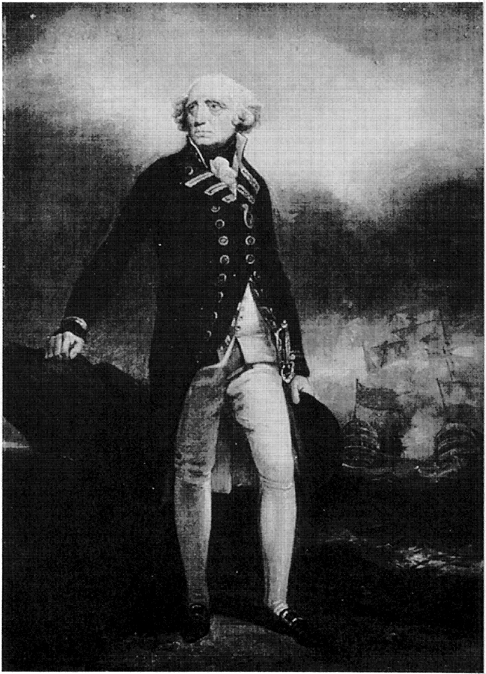
ADMIRAL LORD RICHARD HOWE
National Portrait Gallery, London
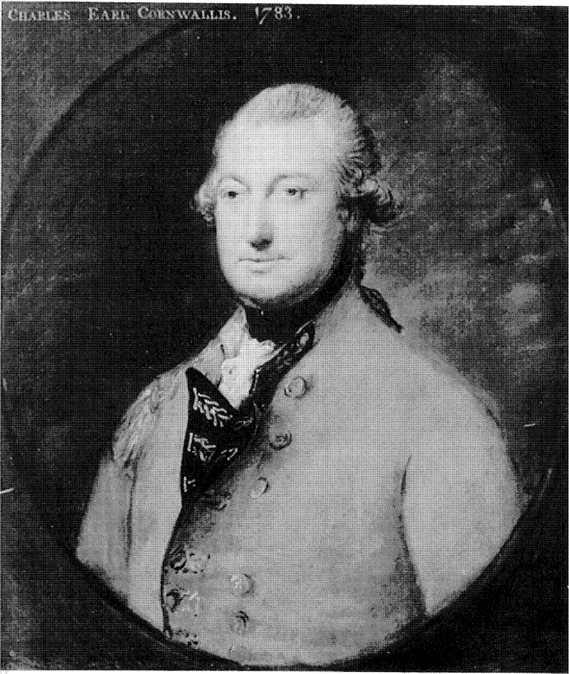
CHARLES, EARL CORNWALLIS
National Portrait Gallery, London
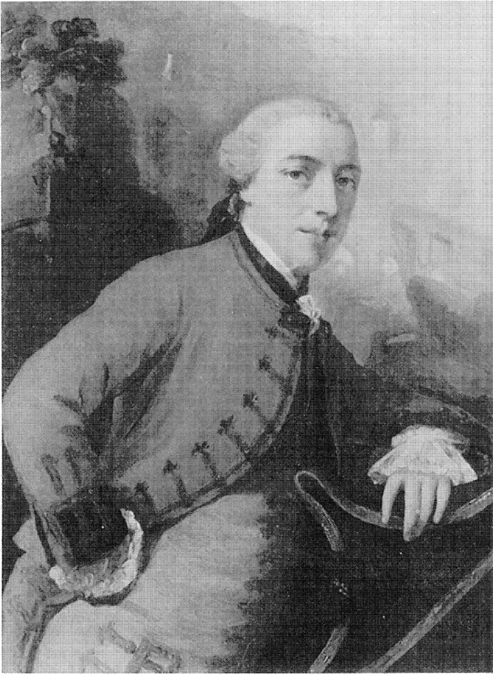
MAJOR GENERAL JOHN BURGOYNE
National Portrait Gallery, London
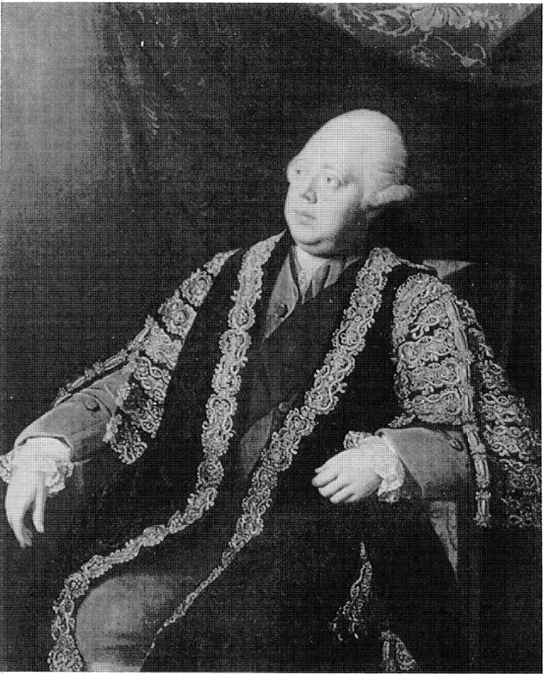
LORD FREDERICK NORTH
National Portrait Gallery, London
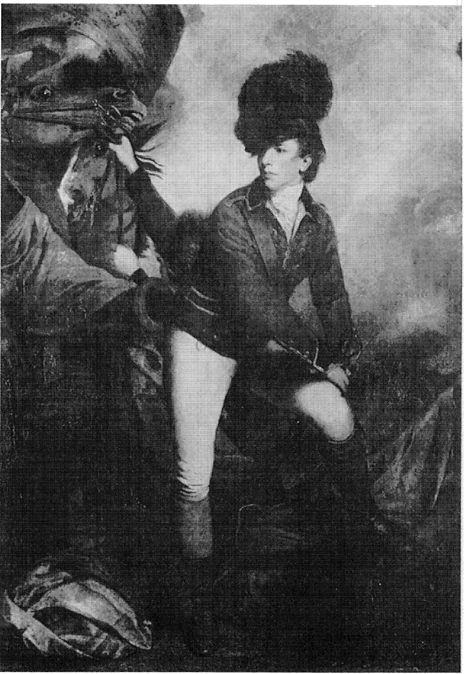
COLONEL BANASTRE TARLETON
National Gallery, London
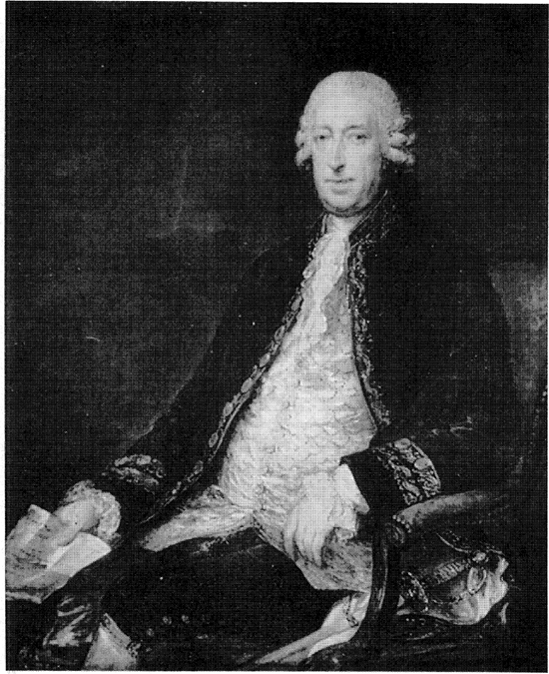
LORD GEORGE GERMAIN
Courtauld Institute of Art and Captain Nigel Stopford-Sackville
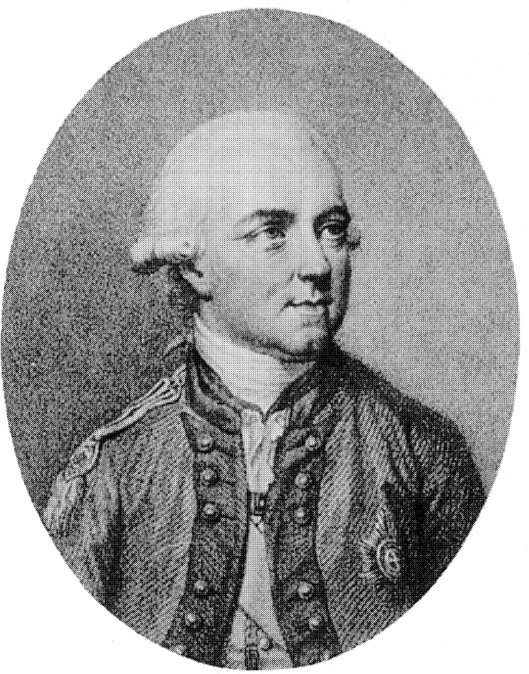
SIR HENRY CLINTON
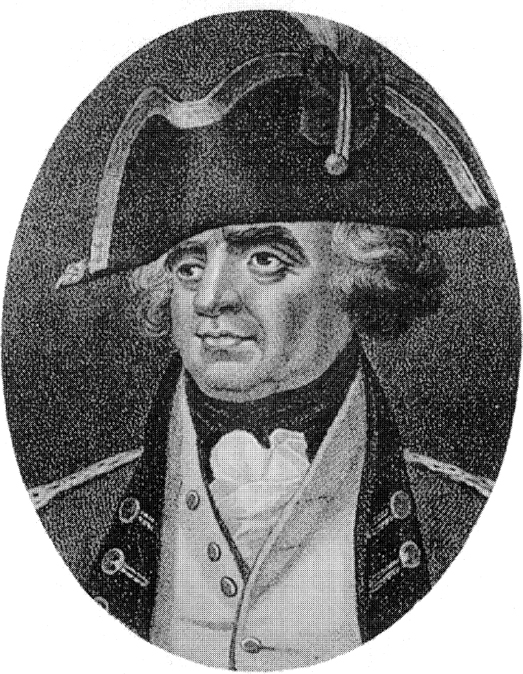
GENERAL SIR WILLIAM HOWE
In Paris the idea of war with Britain was welcomed by the public. Benjamin Franklin had recently arrived to add his prestigious support to Silas Deane’s negotiating team and had been given an ecstatic reception both by the court at Versailles and by Parisian society. In a few weeks the young Marquis de Lafayette, a member of one of France’s top families, was to sail for America with a group of officers to offer his services to Congress.
The mood of the French was dangerous enough without further complications, but poor Stormont had the added difficulty that at Versailles at the center of this ever-changing power complex was a sexually impotent, slow-witted young king and a strong-willed but utterly frivolous queen.
For although Marie Antoinette paid “no great attention” to politics, she was keenly interested in her personal power, which she could use to reward friends by deploying her influence with the King.
One of her proteges was M. de Sartines, the War Minister. “He is a master of little cabal and intrigue . . . ,” warned Stormont. “He inclines to hostile measures. . . .”
Against this background of diplomatic brinkmanship, the degree of pressure it was politic for Stormont to lever depended to a large extent on the news of Howe’s armies. And on that day in late January when he called on Vergennes at Versailles to complain about the French arms ships the news was particularly favorable.
The latest dispatches from New York had reported the successful and easy storming of Fort Washington and the rapid retreat of the rebels through New Jersey under pursuit by Cornwallis. A letter from Clinton which had just arrived told of taking Rhode Island without a single casualty.
After the string of British victories through the summer, the prospects for the revolutionaries seemed very dim, so Stormont was more aggressive than usual, pressing Vergennes to take action to curb Beaumarchais’ activities.
Blandly Vergennes denied all knowledge of the ships and offered to make inquiries of M. de Sartines, the War Minister. But this time the ambassador refused to let him sidestep the issue and virtually accused him of lying. “It’s well known in the Palace,” he insisted, according to his report, “that Beaumarchais directs the whole of this enterprise and that he . . . has frequent interviews with Franklin and Deane.”
He had reason to believe that the arms ships were not bound for Santo Domingo, their usual fictitious destination, but for America. “Suffering the Rebels to be supplied with ammunition,” he insisted, “is contrary to the friendship this Court has professed for us. . . .”
Boldly he bared the Santo Domingo cover story. A few weeks back an English man-of-war had stopped a ship that was routed there and on board found nearly 30,000 French-made uniforms. It would be impossible, he argued, to suppose that so many were “designed for the garrison.”
“What!” exclaimed the minister, “do they send uniforms ready made up?” But his expression suggested that Sartines and Beaumarchais, with their “engines” and their “wheels within wheels,” were going too far. He took the ambassador into his confidence by hinting at his problems in the council. “Nous avons aussi,” he said, “notre opposition.”
But the ships went on loading. Repeatedly Stormont protested, and repeatedly Vergennes, smiling disarmingly, insisting he had difficulties with his colleagues, sympathized, evaded, offered to make further inquiries.
Three weeks later, on February 25, Stormont stalked through the corridors of the palace with even greater cause for complaint: The American privateer Reprisal had gone into the French port of L’Orient, taking with her four English ships she had captured. Stormont demanded that the French government hand over the prizes to their British owners and take steps to stop rebel privateers from raiding the sea lanes from French coastal waters.
Vergennes appeared deeply disturbed by the news, of which he was, he said, completely unaware. He would send an immediate instruction to L’Orient that the Reprisal and her captures must “instantly put to sea.”
By that day, however, news had just arrived from America that was not quite so favorable to British diplomacy. Stormont was angered to see the accounts of Trenton and Princeton greeted rapturously by the French and exploited by Franklin and Deane to seem like great victories instead of skirmishes.
At Versailles, Stormont explained to Vergennes “the utter falsehood of the reports which the Rebel agents had so industriously propagated here and which were so greedily received . . . speaking to him always upon the supposition of his being pleased with our successes.” Vergennes, Stormont reported, “told me indeed that he never had given credit to these reports and I know he has said as much to others. He seemed struck when I told him that in six weeks our fleets had taken over 200 American ships.”
All the same, despite the smooth assurances, there were signs that the rebels’ fast winter raids in New Jersey had caused a new hardening in the attitude of the French court that had begun to soften slightly under the British successes of the autumn. Even by March 18, nearly a month after Stormont’s protest, the Reprisal and her prizes were still in port at L’Orient, despite repeated British complaints and Vergennes’ insistence that he had instructed them to sail. Worse, the British ships had been sold and were now being fitted out to run ammunition under French colors across the Atlantic. In addition, only a few days before, two other vessels had left Le Havre, “cleared out for St. Domingo,” laden with cannon.
Stormont demanded repeated audiences with the Foreign Minister, but although he was given the same courteous reception by Vergennes, he achieved no tangible results.
“Suppose, Sir,” the ambassador challenged, “any of our cruisers meet with these ships carrying French colors and manned with French sailors?”
“Your cruisers will take them,” answered Vergennes lightly as though the matter were truly simple. Then he added quickly: “You would restore to us the sailors.”
By the end of the month the veneer on the relationship was wearing thin. “Notwithstanding all the friendly professions of this court,” Stormont wrote home furiously, “the secret succour to the Rebels not only continues, but increases.”
By then the rumors at Versailles were growing more sinister. Silas Deane began to visit Versailles more often—“he was there no less than four times this week”—and Stormont was working desperately hard to discover if there was any truth in the stories circulating through the palace that the French were about to sign a formal treaty with Congress. Inevitably this would mean recognition of an independent America—and, of course, war.
The rebel contacts with the Spanish were ominous, too. Arthur Lee, one of the Congressional agents, was now in Madrid for talks, according to information at the British embassy. He had written to Paris that he had had “assurances not only of money but of every other assistance. Let France but begin, say the Spaniards, and we are ready to follow.”
“It is certain, My Lord,” Stormont warned Secretary of State Lord Weymouth, “that the general animosity against us and the wild enthusiasm in favor of the rebels was never greater than it is at present . . . that M. de Vergennes is hostile in his heart and anxious for the success of the Rebels I have not a shadow of a doubt.”
Events were becoming critical, and Franklin and Deane were now exploiting them by indicating to Stormont, through contacts they had in common, that they were open to a peace deal with the British. “Their language,” he reported, “is that England should make some fair proposal and make it before they have thrown themselves into the arms of France. I have a strong suspicion that there is much artifice in all this. Perhaps they want to carry in their hands some proposal from us when they get to treat with this Court.”
Certainly the French government had suddenly become ultra-nervous about the danger of a British attack coupled with a deal with the rebels. At Versailles, according to Stormont’s spies, ministers challenged Deane with double-dealing and “were not satisfied until he denied it in the strongest and most positive terms.”
When the news arrived in France that the British had put in commission five more ships of the line, it “spread a great alarm at Versailles; the general cry was that it was now evident that England meant a sudden attack.” Promptly the Cabinet reacted to the crisis by ordering the arming of seven men-of-war, although in fact the British move had no anti-French design: The ships were destined for America, where Howe was demanding reinforcements.
The rising tension led once more to some plain speaking by Stormont at the Palace of Versailles—this time with the Comte de Maurepas, the French Prime Minister. It was a significant and important meeting.
France, the Premier warned him carefully, would clearly have to yield soon to heavy pressure from the Spanish government to send a defensive fleet to the Caribbean. Stormont was astonished at the implication. The British had trouble enough on the other side of the Atlantic. “It’s impossible,” he argued, “that they should believe that either the French or Spanish islands are in the least danger of attack from us.”
Maurepas did not think it was so impossible. There were suspicions, he said, that Britain was planning to give the rebels favorable terms “providing [sic] they immediately join . . . in an attack upon the French settlement in the West Indies.”
Indignantly Stormont refuted the French fears and exploited his chance to complain again about the glowing reception at Versailles of rebel agents who declared openly that they were about to sign a treaty with France. Only one article, he challenged, seemed to be holding it up: French insistence that they should never make peace with England, no matter how favorable the terms might be, without the express permission from Versailles.
“‘It’s not true! It’s not true,’ said M. de Maurepas repeatedly. . . . ‘That’s not the article that prevents any treaty with them. I will tell you what the article is: It is that of their independency. We have repeatedly told them: You call yourselves an independent state, but you are not so. . . . At present you are at war with your sovereign who by no means admits the independency you assume. If you become a free independent state like Holland, we will then make any treaty of friendship or commerce that shall be for our mutual advantage. . . .
“‘Still, I do not imagine,’ he continued with a smile, ‘that you will be in haste to grant them that independency.’“
It was an assurance that, even though it came from the French King’s principal minister, Stormont could hardly believe. All his other evidence carried a very clear message: Unless Britain stamped out the Revolution before the end of the year, the danger of a French attack would be very acute indeed.
It was April, 1777—the year, as a Whig satirist was to dub it because of the gibbet shape of the 7’s, of “the triple gallows.” By then Britain’s plans to quell the revolt before the end of the year were completed in London and already in motion.
In December Major General John Burgoyne had arrived back in London after serving as second-in-command under Carleton in the operations against Arnold on Lake Champlain. He had not been home more than a few days before his detailed campaign proposals for an advance on America from Canada lay on Germain’s desk.
Burgoyne’s plan conformed with the overall design that the King and his senior officers had framed from a very early point in the Revolution: two combined movements along the Hudson from Lake Champlain in the north and from New York in the south, thus cutting off New England from the rest of the American provinces.
The general did not specifically propose himself as the commander of the northern army, but the profile he drew of the ideal man to head the expedition fitted him so exactly that no doubt was left that this was what he had in mind.
Burgoyne was an interesting character, combining a flair for living on his wits with more solid talents. He was a good and courageous cavalry commander; he wrote well—in fact one of his plays was attributed to Sheridan—and he was brilliant at cards. At fifty-five he was still strikingly handsome, elegant and popular with everybody—women, men and, particularly, his soldiers. All the areas at which he excelled provided opportunities for personal display; Burgoyne was a performer—which is why he was far more suited to leading cavalry than to commanding an army.
Successful generals needed the panoply of leadership, which Burgoyne certainly had, and the faith of their soldiers that went with it, but essentially they were background figures. They did not charge the enemy; they directed. Victories were won by careful control of such elements as strategy and organization, and it was here that Burgoyne was weak.
It is strange that he did not recognize this, for he was a highly intelligent man. His progressive and humanitarian ideas on leading men, for example, were completely novel. He did his utmost to eliminate flogging and even swearing at the soldiers. He gave formal orders that they should be treated as “thinking beings” and urged his officers to have “the occasional joke” with them.
Burgoyne’s meteoric success, though it came comparatively late, was phenomenal, for his background was limited. His overextravagant father was only the second son of a baronet, and in a privileged society dominated by the peerage, this was not exactly ideal as a starting base for an ambitious young man. But “Johnny” Burgoyne had a flair for getting on with influential people and a deep capacity for friendships. Many of his friends remained close to him throughout his somewhat erratic life; one of the first, whom he met at school, was the eldest son of the powerful Earl of Derby. In time this was to prove an enormous advantage, although temporarily it severely hampered his career opportunities, for he fell in love with the earl’s daughter as a young dragoon officer and impetuously eloped with her.
He resigned his commission, though reports differ on whether this was forced by his angry father-in-law or by rash play at the card table where he had not yet perfected his skill, and for seven years lived in semidisgrace on the Continent. Eventually, Derby forgave him and deployed his immense influence to help him.
In career terms it was a late start—he was thirty-four when he rejoined the army—but he was ready for his opportunity when it came. He was appointed to organize the newly formed regiment of mobile light dragoons, which the British were to use very successfully in America, and he was ideally equipped to do it.
Burgoyne was highly successful, both with his regiment and at court, where the two kings he served were keen soldiers. George II honored him; George III, as the press regularly announced, was always reviewing his troops. His new ascendancy was sealed when in 1762 he took his dragoons to help Britain’s ally Portugal fight the invading Spanish. The performance of his regiment was spectacular. The King of Portugal was delighted with him, gave him honors and a diamond ring. He returned to London a hero.
By the time the American Revolution broke out he was completely established. He had easy access to the King. His relationship with his powerful father-in-law had ripened into a solid friendship. He was a Member of Parliament and on the short list for senior military command.
Furthermore, Carleton’s decision not to risk storming Ticon-deroga so late in the fall had been a disappointment in Whitehall—especially since Burgoyne, while being careful never to criticize Carleton, made it clear that he himself had recommended an attack. It seemed that a general with just a little more spark and energy was needed to command the combat force.
The time for “Gentleman Johnny,” as he was known by his troops, had arrived. On December 13, just after he had landed in England, the King wrote to Lord North that “Burgoyne may command the corps to be sent from Canada.” Two months later, after the general had revised his operational plan, it was submitted formally to the Cabinet. By then the ministers also knew Howe’s proposals for the coming season—which arrived in the same ship as the dispatches reporting the depressing news of Trenton and Princeton.
Originally, Howe had suggested a strategy similar to Burgoyne’s—two movements north and south along the Hudson—in addition to a secondary attack on Boston from the base he had already set up on Rhode Island. New England would then be ringed by British posts.
But now Howe changed his mind. He had seen Jerseymen pouring into the towns to sign the oath of allegiance to the King and since he was assured that the loyalism of Pennsylvania was even stronger, his new plan was to make a quick strike south across the Delaware for Philadelphia and to use only limited forces on the southern Hudson “to facilitate in some degree the approach of the Army in Canada.” From Philadelphia he would be ideally positioned for his followup plan in the fall—a campaign in the mild winter weather to stamp out the last embers of revolt in the Southern provinces.
There was logic in Howe’s suggestion. He always thought in terms of carefully spreading the territory he controlled because this enabled him to administer it properly. His plan to absorb Jersey and Pennsylvania fitted this pattern of thinking, especially since their underlying loyalty should make them easy to police.
He was not particularly concerned by the fact that his new proposals provided no big force to move up the Hudson to meet the advance from the north. For he took the view,2 which was proved correct, that since he commanded the main British army, Washington must move to oppose him wherever he attacked. By driving south for Philadelphia, he would draw the rebel force away from the British strike from Canada.
Clearly the rebel commander would be able to spare only a very limited detachment from the Continental Army to go north, relying mainly on the militia to defend the upper Hudson, and the militia, though they had been effective on the Concord road and Bunker Hill, had since been unimpressive in battle; if their response to an approaching army was anything like that of the New Jerseymen, very few of them would report for duty anyway.
In London, both plans seemed acceptable. But the big problem that the Cabinet faced was not so much Howe’s proposal to go south as his demand for reinforcements. He had asked for 20,000 more troops. Germain promised him 7,800 men but was unable to meet even this limited target; fewer than 3,000 men sailed for New York.
Meanwhile, plans for the northern army progressed fast. Burgoyne hammered out the final details with Christian D’Oyly, Deputy Secretary at War, and took them personally to the King, who gave his formal agreement to both operations. The two commanders were each fully informed of what the other was planning to do. Burgoyne’s orders specifically required him to proceed down the Hudson to Albany and there to place himself under the command of Howe, but Howe was going to Philadelphia and might not be there to meet him.
This suggests a contradiction in the orders, and unquestionably they were very vague; but almost certainly the key to what appears to be extraordinarily muddled thinking lay primarily in the timing. Howe planned to go south in the spring and intended a “quick” operation. He did not expect the northern army to be at Albany “until September,” some four months after the start of the campaigning season. If it did prove necessary to support the strike from Canada, there would be plenty of time to send troops north. The important action would be staged in Pennsylvania, for Howe now realized that to extinguish the revolt finally he must annihilate the rebel army in battle. This was now his purpose.
As for Germain, who issued the formal approval of the campaign proposals, he wanted action. He lived in a state of perpetual frustration; events, motivated both by men and by God, were always delaying his bellicose plans. “Do we now need two winds for a ship to sail?” he demanded disgustedly when he heard that a vessel had not left for America despite a favorable breeze. Now, at least, he was being offered aggressive operations on two fronts. His belligerent and energetic effort through the winter had succeeded in forcing some results out of Britain’s antiquated supply machine. Recalling his difficulties of the previous year when Quebec lay under siege, he had bludgeoned the Lords of the Admiralty for ships and had levered heavy pressure on the other government departments responsible for equipping and manning the northern army. By the end of March, preparations were nearing completion. Soon troops would be ready to sail, and astonishingly, there would be transports waiting to take them.
Burgoyne wasted no time. At Almack’s Club, he had bet Charles James Fox 25 guineas that he would be back in England by Christmas Day. “Be not over-sanguine,” cautioned the politician, “I believe when you return to England you will be a prisoner on parole.”
Burgoyne had laughed it off. Now with the command of an army of nearly 8,000 men, it seemed an even more groundless warning.
On March 26, only twenty-four hours after Carlton’s instructions were signed in the Colonial Office, Burgoyne drove hurriedly to Plymouth to board the ship that would take him to Canada.